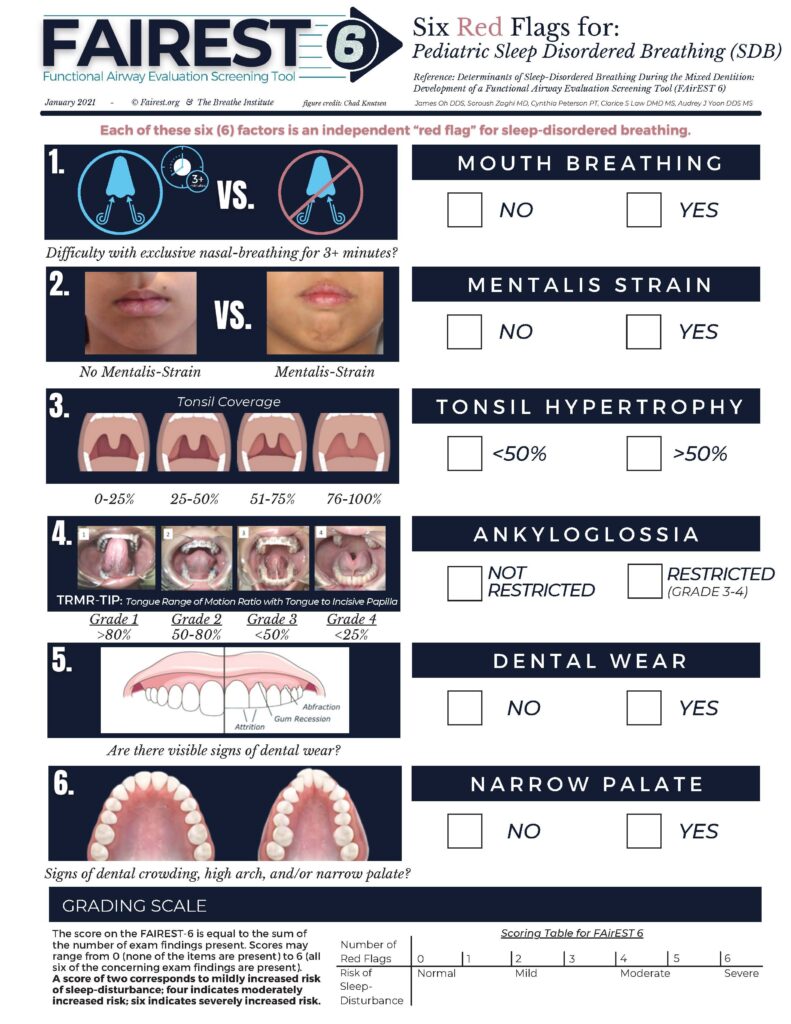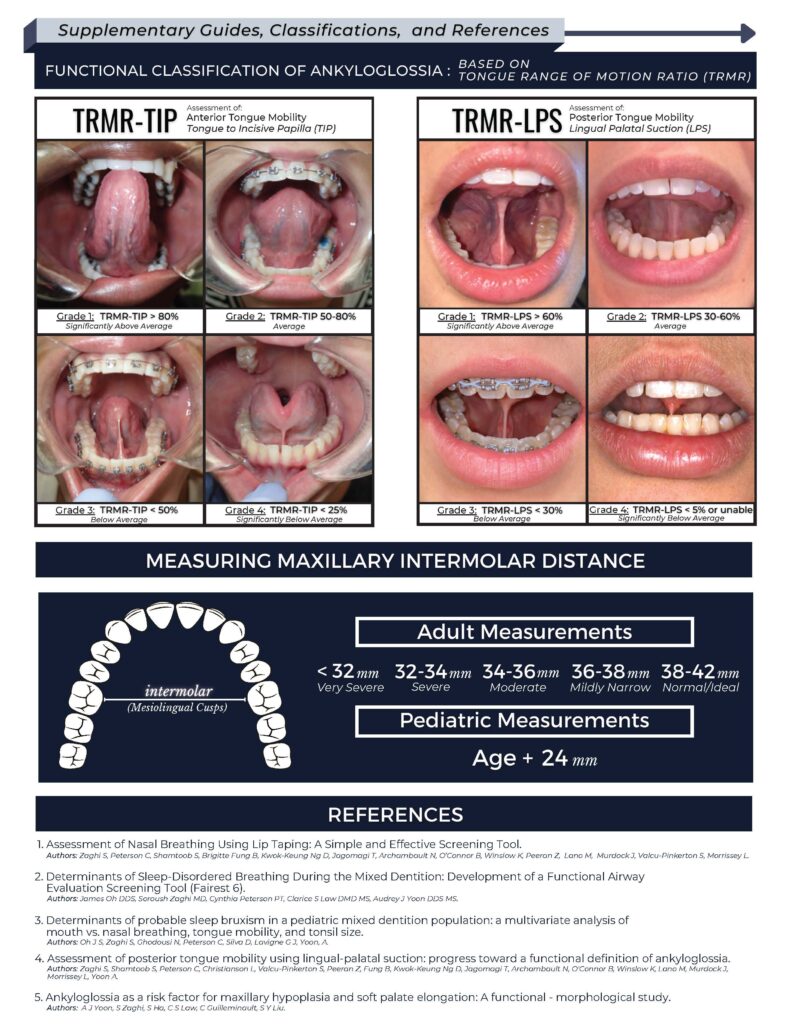Comprehensive exams are typically conducted for new patients, or every three to five years for existing patients, depending on their past and current treatment.
Once all aspects of the exam have been completed, we will review the findings with you and discuss any areas of concern at a follow up Second Consultation Visit. The doctor will review all findings from your Comprehensive Exam, Diagnostic Models, Photographs and Digital CBCT 3D scan, at which point you will have the opportunity to discuss your won concerns and ideas for your treatment plan. The doctor and you will decide together on the steps to begin your journey toward oral and overall health.
By completing a comprehensive airway exam, both you and your doctor will be equipped with all the information you need to ensure your achieve your oral health goals.
fAIRest 6 plus 4 Screening Tool is used to quickly screen for breathing disorders and to easily see what anatomical and functional existing conditions can be contributing to this disfunction. Introduced by Dr. Saroush Zaghi of The Breathe Institute to help practitioners of all medical and dental specialties to quickly screen for Disordered Breathing


Ankyloglossia, more commonly referred to as tongue tie, is when the bottom of the tongue is attached to the floor of the mouth by an overly short and thick lingual frenulum. The cause of the condition is not known, but genes may play a role since it tends to run in families.
Some symptoms include a tongue with limited range of motion, trouble sticking out the tongue past the lower front teeth or a tongue that appears notched or heart shaped when stuck out. It can also cause esthetic issues by pulling the gums away from the teeth causing a gap between the lower front teeth.
Ankyloglossia in children can lead to a range of problems, such as difficulties breastfeeding, speech impediments, poor oral hygiene, and embarrassment
during childhood.
In cases the lingual frenulum attachment is severe enough to interfere with daily life, your doctor will work with you to develop a plan of care to correct the issue and prevent any additional complications for your infant, child or you.
A frenectomy is a simple surgical procedure that can be completed with the use of the CO2 Lightscalpel laser and sutures for adults and older children. The doctor uses sterile scissors or a laser to snip the
frenulum free. The procedure is quick with minimal bleeding or discomfort.
Myofunctional therapy is a program used to correct the improper function of the tongue and facial muscles.
Myofunctional therapy is a series of highly effective physical therapy exercises. It involves strengthening of the tongue and orofacial muscles by teaching individuals how to engage the muscles to the appropriate position. They also help keep the airway open, especially during sleep.
Myofunctional therapy may also be an effective treatment for sleep-disordered breathing. Sleep-disordered breathing is a group of sleep conditions that cause a reduction in airflow through your upper airways. It includes heavy snoring and obstructive sleep apnea. Myofunctional therapy treatment is safe and relatively inexpensive, which makes it an attractive alternative to other treatments
Proper diagnosis allows for targeted and effective therapy exercises for oral posture to promote better health with the goals to improve breathing, reduce pain and enhance quality of life. Improper patterns can lead to a host of health problems and conditions including:
- Sleep-disordered breathing (including snoring and sleep apnea)
- Bruxism/Clenching
- Neck and shoulder tension
- Headaches
- Gastroesophageal reflux (GERD) or Heartburn
- Orthodontic relapse
Sleep-Disordered Breathing: Correcting the swallow pattern and tongue placement helps in building the lifting of the soft palate and increasing nasal breathing. This allows for greater airflow and decrease of snoring. In turn there is more oxygen taken in continuously.
Bruxism/Clenching: Myofunctinal therapy can identify improper nasal breathing which is often the main contributor to bruxing or clenching. Therapy provides awareness of the habit and provides strategies to reduce or eliminate clenching or Bruxing
Gerd/Acid Reflux: When a correct swallow exists it causes more force in the initiation of the swallow. A force full swallow allows for what is being swallowed to move further into the stomach and not be caught in the esophagus allowing for the potential reflux.
Orthodontic relapse: Orthodontic relapse can occur because the underlying oral myofunctional disorders that caused the orthodontic issues in the first place have never been corrected. The tongue is often where the problem actually lies. It should rest in the top of the mouth, filling the palate all the way from the front to the back. In addition, the mouth needs to be closed and lips together, and the swallowing pattern needs to be correct, without a tongue thrust that causes the tongue to push forwards against the teeth each and every time we swallow.
Meet our Myofunctional therapist Crystal Steffen, RDH
Are you or a loved one struggling with sleep apnea, snoring, or breathing issues? The solution may be closer than you think. Advances in technology have paved the way for innovative treatments, and one such breakthrough is the use of the CO2 Lightscalpel Laser for soft palate elongation.
How is this cutting-edge laser technology making a significant impact on improving symptoms related to sleep apnea?
Understanding Soft Palate Elongation and Sleep Apnea: Soft palate elongation is a common contributor to sleep apnea, a condition characterized by interruptions in breathing during sleep. When the soft palate becomes too long or floppy, it can partially or completely block the airway, leading to snoring, disrupted sleep, and other respiratory issues. Traditional treatments have often involved invasive surgical procedures, but the CO2 Lightscalpel Laser offers a less invasive and more precise alternative.
The CO2 Lightscalpel Laser is a state-of-the-art non surgical technology that utilizes a high-precision laser beam to tighten collagen without surgery and minimum post operative pain.
How It Works: The laser works by precisely targeting and reshaping the soft palate, reducing its length and stiffness. This controlled and accurate approach ensures that only the necessary tissue is affected, minimizing damage to surrounding areas. The procedure is typically performed on an outpatient basis, and many patients experience rapid recovery with less discomfort compared to traditional surgical methods.
Benefits of CO2 Lightscalpel Laser Treatment:
Precision and Accuracy: The laser allows for precise tissue tightening, minimizing the risk of complications and promoting a faster recovery.
Minimally Invasive: Unlike traditional surgical procedures, the CO2 Lightscalpel Laser is less invasive, reducing the overall trauma to the soft palate.
Quick Recovery: Patients often experience a faster recovery time, allowing them to resume their normal activities sooner, even within the same day. Most symptoms are no worse than a slight sore throat.
Improved Sleep Quality: By addressing soft palate elongation, the treatment can significantly improve symptoms associated with sleep apnea, including snoring and breathing issues.
Customized Treatment: The laser can be adjusted to meet the specific needs of each patient, ensuring a tailored approach to soft palate elongation.
The CO2 Lightscalpel Laser represents a groundbreaking advancement in the treatment of sleep apnea symptoms related to soft palate elongation. If you or someone you know is struggling with snoring, breathing issues, or sleep apnea, consider exploring this innovative and minimally invasive treatment option.
Consult with a qualified healthcare professional at Riverwalk Dentistry to determine if the CO2 Lightscalpel Laser is the right solution for you, and take the first step toward a better night's sleep and improved overall well-being.

Regular, preventative care is an affordable choice. Don't wait until it hurts.
735 N. Water Street, Suite 826, Milwaukee, WI 53202 |
Phone: 414-271-1770
Copyright ©2015 Riverwalk Dentistry, SC | All Rights Reserved.
Copyright ©2024
Riverwalk Dentistry, SC
All Rights Reserved